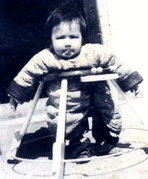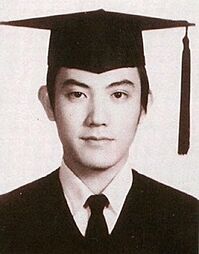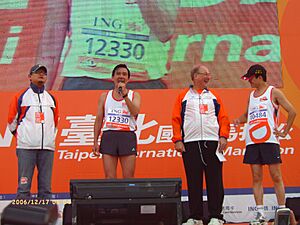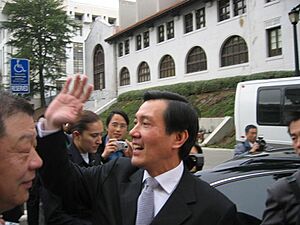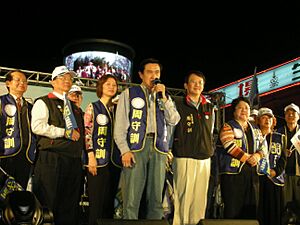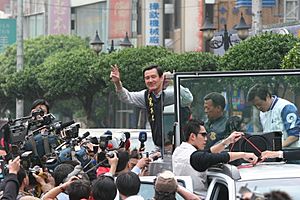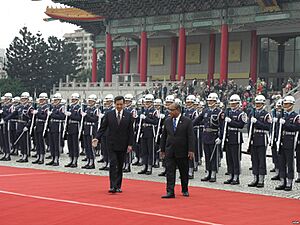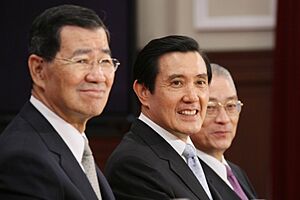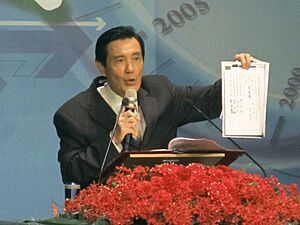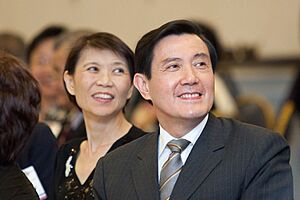Ma Ying-jeou facts for kids
Quick facts for kids
Ma Ying-jeou
|
|||||||||||||||||||||||||||||||||||
|---|---|---|---|---|---|---|---|---|---|---|---|---|---|---|---|---|---|---|---|---|---|---|---|---|---|---|---|---|---|---|---|---|---|---|---|
|
馬英九
|
|||||||||||||||||||||||||||||||||||
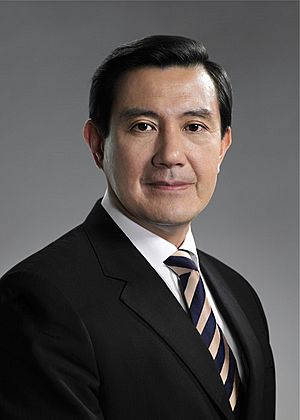
Official portrait, 2008
|
|||||||||||||||||||||||||||||||||||
| 6th President of the Republic of China | |||||||||||||||||||||||||||||||||||
| In office 20 May 2008 – 20 May 2016 |
|||||||||||||||||||||||||||||||||||
| Premier |
|
||||||||||||||||||||||||||||||||||
| Vice President | Vincent Siew Wu Den-yih |
||||||||||||||||||||||||||||||||||
| Preceded by | Chen Shui-bian | ||||||||||||||||||||||||||||||||||
| Succeeded by | Tsai Ing-wen | ||||||||||||||||||||||||||||||||||
| 4th & 6th Chairman of the Kuomintang | |||||||||||||||||||||||||||||||||||
| In office 17 October 2009 – 3 December 2014 |
|||||||||||||||||||||||||||||||||||
| Preceded by | Wu Po-hsiung | ||||||||||||||||||||||||||||||||||
| Succeeded by | Wu Den-yih (acting) | ||||||||||||||||||||||||||||||||||
| In office 27 July 2005 – 13 February 2007 |
|||||||||||||||||||||||||||||||||||
| Preceded by | Lien Chan | ||||||||||||||||||||||||||||||||||
| Succeeded by | Wu Po-hsiung (interim) | ||||||||||||||||||||||||||||||||||
| 11th Mayor of Taipei | |||||||||||||||||||||||||||||||||||
| In office 25 December 1998 – 25 December 2006 |
|||||||||||||||||||||||||||||||||||
| Deputy | King Pu-tsung | ||||||||||||||||||||||||||||||||||
| Preceded by | Chen Shui-bian | ||||||||||||||||||||||||||||||||||
| Succeeded by | Hau Lung-pin | ||||||||||||||||||||||||||||||||||
|
|||||||||||||||||||||||||||||||||||
| Personal details | |||||||||||||||||||||||||||||||||||
| Born | 13 July 1950 Kowloon, Hong Kong |
||||||||||||||||||||||||||||||||||
| Political party | Kuomintang | ||||||||||||||||||||||||||||||||||
| Spouse |
Christine Chow
(m. 1977) |
||||||||||||||||||||||||||||||||||
| Relations | Ma Chao (ancestor) Gene Yu (nephew) |
||||||||||||||||||||||||||||||||||
| Children | 2, including Lesley | ||||||||||||||||||||||||||||||||||
| Education | National Taiwan University (LLB) New York University (LLM) Harvard University (SJD) |
||||||||||||||||||||||||||||||||||
| Scientific career | |||||||||||||||||||||||||||||||||||
| Fields | International law | ||||||||||||||||||||||||||||||||||
| Thesis | Legal Problems of Seabed Boundaries and Foreign Investment in the East China Sea (1981) | ||||||||||||||||||||||||||||||||||
| Doctoral advisor | Louis B. Sohn Detlev F. Vagts |
||||||||||||||||||||||||||||||||||
| Military career | |||||||||||||||||||||||||||||||||||
| Allegiance | |||||||||||||||||||||||||||||||||||
| Service/ |
|
||||||||||||||||||||||||||||||||||
| Years of service | 1972–1974 | ||||||||||||||||||||||||||||||||||
| Rank | |||||||||||||||||||||||||||||||||||
| Chinese name | |||||||||||||||||||||||||||||||||||
| Traditional Chinese | 馬英九 | ||||||||||||||||||||||||||||||||||
| Simplified Chinese | 马英九 | ||||||||||||||||||||||||||||||||||
|
|||||||||||||||||||||||||||||||||||
Ma Ying-jeou (born July 13, 1950) is a Taiwanese politician and lawyer. He served as the sixth president of the Republic of China (Taiwan) from 2008 to 2016. Before becoming president, he was the mayor of Taipei, Taiwan's capital city, from 1998 to 2006. He was also the chairman of the Kuomintang (KMT), a major political party in Taiwan.
Ma was born in Hong Kong, and his family moved to Taiwan when he was a baby. He studied law at National Taiwan University and later earned advanced law degrees from New York University and Harvard University in the United States.
As president, Ma focused on improving the relationship between Taiwan and mainland China. This included starting direct flights and signing a major trade agreement. He met with Chinese leader Xi Jinping in 2015, which was the first meeting between the leaders of the two sides since 1949. After his presidency, Ma became a law professor and has remained active in politics.
Contents
Early Life and Schooling
Ma Ying-jeou was born in Hong Kong on July 13, 1950. His family came from a long line of respected figures, and his ancestor was even a famous general named Ma Chao from the Three Kingdoms period of China. When Ma was one year old, his family moved to Taiwan.
His father encouraged him to study hard, practice Chinese calligraphy, and be good at sports. In high school, Ma decided he wanted to study law. He did very well on his exams and went to National Taiwan University (NTU) to study law.
At NTU, Ma was a student leader. In 1972, he graduated with a law degree. After graduation, he served in the Republic of China Marine Corps for two years. He then won a scholarship to study in the United States.
Ma earned a Master of Laws degree from New York University in 1976. He then went to Harvard Law School, where he earned his Doctor of Juridical Science degree, which is the most advanced law degree, in 1981. His teachers at Harvard remembered him as a "brilliant student."
Starting His Political Career
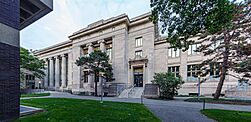
After finishing his studies, Ma returned to Taiwan in 1981. President Chiang Ching-kuo was impressed by him and appointed Ma as his personal English translator. Ma also taught law at National Chengchi University.
At age 38, he became the youngest cabinet member ever when he was appointed chairman of the Research, Development and Evaluation Commission. Later, he was appointed Minister of Justice in 1993. As minister, he became famous for his strong stance against corruption. He worked hard to make sure government officials were honest, which earned him the nickname "Mr. Clean."
His tough policies were not popular with everyone in his party, and he left the position in 1996. He returned to teaching at National Chengchi University. Even after leaving office, he remained one of the most popular politicians in Taiwan.
Mayor of Taipei (1998–2006)
In 1998, the Kuomintang (KMT) party asked the popular Ma to run for mayor of Taipei. He ran with the slogan "Taiwan First, Taipei First" and promised to make Taipei a "world-class city." He won the election and became the mayor of Taiwan's capital.
During his time as mayor, Ma was known for being loyal to his party. He was easily re-elected in 2002 with 64% of the vote. As mayor, he made changes to the city, such as updating the names of streets and Taipei Metro stations.
In 2005, while still mayor, Ma was elected chairman of the KMT party. He led the party to a big victory in local elections later that year.
Path to the Presidency
As his time as mayor was ending, Ma faced some political challenges. He was questioned about how he used a special expense account while he was mayor. Ma said he had followed the rules and that the money was used for public benefit.
In February 2007, he was officially charged, but he maintained his innocence. He resigned as KMT chairman but announced that he would still run for president in the 2008 election. The courts later found him not guilty of all charges, clearing his name before he became president.
Ma was officially nominated as the KMT's candidate for president in May 2007. He chose former premier Vincent Siew as his running mate. During the campaign, his opponents questioned his loyalty to Taiwan because he was born in Hong Kong and some of his family members were U.S. citizens. Ma stated that he was fully committed to Taiwan.
On March 22, 2008, Ma won the presidential election with 58% of the vote, ending eight years of rule by the rival Democratic Progressive Party (DPP).
Presidency (2008–2016)
Ma Ying-jeou took office as president on May 20, 2008. He was named one of Time magazine's 100 most influential people that year. His presidency focused on two main areas: improving relations with mainland China and strengthening Taiwan's economy.
Improving Relations with Mainland China
One of Ma's biggest goals was to create better "cross-strait relations," which means the relationship between Taiwan and mainland China. He promised "no reunification, no independence, and no use of force."
Under his leadership, talks between Taiwan and mainland China started again. This led to several important changes:
- Direct Links: For the first time in almost 60 years, direct flights, shipping, and mail services began between Taiwan and mainland China in 2008.
- Tourism: Taiwan was opened to tourists from mainland China.
- Trade Agreement: In 2010, Taiwan and China signed the Economic Cooperation Framework Agreement (ECFA), a major trade deal designed to lower taxes on goods and boost the economy.
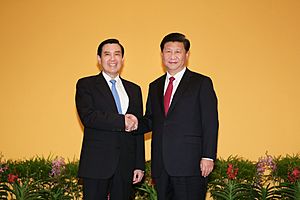
The most historic moment of his presidency came on November 7, 2015. Ma met with Xi Jinping, the leader of mainland China, in Singapore. It was the first time the leaders of the two sides had met since 1949.
Economic and Other Challenges
When Ma became president, the world was facing a major economic crisis. Taiwan's economy struggled, and many companies faced difficulties. Ma's government introduced a large economic stimulus package to help businesses and create jobs. The economy began to recover and grew strongly in 2010.
In 2009, Taiwan was hit by Typhoon Morakot, one of the worst storms in its history. Ma's government was criticized for its slow response to the disaster. He later apologized and made changes to his government team.
Ma was re-elected in 2012, defeating DPP chairwoman Tsai Ing-wen. In his second term, he faced protests from student groups, known as the Sunflower Student Movement, over a trade deal with China. His party lost a lot of support in the 2014 local elections, and he resigned as KMT chairman.
Life After the Presidency
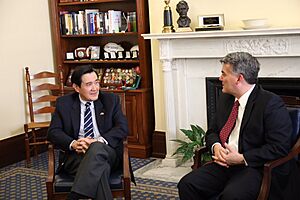
After leaving office in 2016, Ma did not retire from public life. He became a law lecturer at Soochow University, teaching students about Taiwan's history and law.
He also started the Ma Ying-jeou Foundation in 2018. The foundation's goal is to help find the right path for Taiwan's future and support young people.

In 2023, Ma made a historic trip to mainland China, becoming the first former or current Taiwanese leader to visit since 1949. He said he hoped his visit would promote peace. He has visited China several times since then, meeting with Chinese leader Xi Jinping again in 2024.
Political Views
Ma's political views are centered on maintaining a stable and peaceful relationship between Taiwan and mainland China.
- Cross-Strait Relations: He believes that talks between the two sides should be based on the "1992 Consensus," an understanding that both sides agree there is "one China" but can have different ideas about what that means. He describes the relationship as "special" but not one between two separate countries.
- The Five Noes: To keep things stable, Ma proposed a policy of "no unification, no independence, no use of force." This means he did not want to formally unite with China or declare Taiwan an independent country, and he wanted to avoid conflict.
- Peace Initiatives: Ma proposed peace plans for the East China Sea and South China Sea, areas where several countries have disagreements. He called for everyone to work together peacefully and share resources.
Personal Life
Ma married Christine Chow in 1977. They have two daughters, Lesley and Yuan-chung. Lesley studied at Harvard University and New York University, while Yuan-chung studied at the London School of Economics.
Ma and his wife are known for their charity work. They sponsor low-income children in El Salvador through World Vision International. Ma is also the uncle of Gene Yu, a former U.S. Army Special Forces captain who helped rescue a Taiwanese citizen in 2013.
Honours
 Belize:
Belize:
 Burkina Faso:
Burkina Faso:
 Dominican Republic:
Dominican Republic:
 El Salvador:
El Salvador:
 Eswatini:
Eswatini:
 Gambia:
Gambia:
 Guatemala:
Guatemala:
 Haiti:
Haiti:
 Marshall Islands:
Marshall Islands:
- Traditional Paramount Leader Medal (2013)
 Saint Kitts and Nevis:
Saint Kitts and Nevis:
 SMOM:
SMOM:
See also
 In Spanish: Ma Ying-jeou para niños
In Spanish: Ma Ying-jeou para niños
- Politics of the Republic of China
 | Delilah Pierce |
 | Gordon Parks |
 | Augusta Savage |
 | Charles Ethan Porter |


